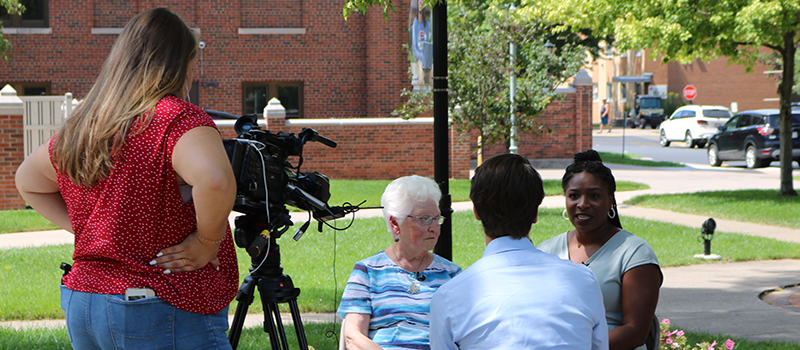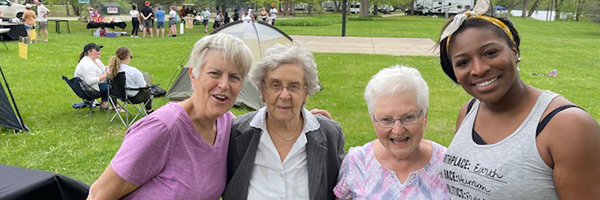Hope Restores: collaboration, friendship, sisterhood

Franciscan Sister of Perpetual Adoration Karen Neuser and Hope Restores’ Tashyra Jackson sit down with WXOW reporter Dustin Luecke
to share their “sister” story with La Crosse
By Annette Mikat
Tashyra Jackson grew up an object of racism. She heard it all: “I’m not a racist; I have several Black friends.” “I don’t see color.” “All lives matter.” It has been her experience, too. A white person, finding Tashyra in an elevator, declined to get in. A woman crossing paths with Tashyra clutched her purse extra tight. Each time, these microaggressions inflicted more trauma.
Then came the stream of absolute aggression in 2020. Within just four months of each other, three Black people — Ahmaud Arbery, Breonna Taylor and George Floyd — were killed by vigilantes and police officers. That was when it hit Tashyra. Her evolving work with Shamawyah (Mya) Curtis to create Hope Restores, a place to help heal the Black community in La Crosse, Wisconsin, was more than a project. It was a calling.
“Repeatedly seeing someone who looks like you killed — it’s hard. The trauma, tears and hurt are not something that will go away soon. We needed to turn that pain into something more meaningful.”
Ready or not, Tashyra and Shamawyah had no choice but to open Hope Restores as fast as possible.
Hope Restores
Hope Restores, based in La Crosse, Wisconsin, works with Black families by facilitating support groups and providing access to tools and resources they need to be successful in life. It is a place where clients are not made to feel convicted due to their cultural upbringing or family values but to find their strengths, build resilience and solve the individual and systemic race-based problems they face every day.
Tashyra says the first step toward healing is to accept that racism is real. “You have to give voice that yes, it happens. Yes, it’s there. Clients need to be heard, so that's why we have groups. But because trauma looks different for everyone, we have to look at how each person heals and give them permission to do it their own way.”
To that end, Hope Restores offers additional supports, such as transportation to medical appointments, grocery stores and job interviews; drop-in daycare; and a giving cabinet where people can pick up nonperishable food items, toiletries and cleaning supplies.
A meeting turns into a sisterhood
A few months after opening Hope Restores, Tashyra and Mya appeared on a local news program that Franciscan Sister of Perpetual Adoration Karen Neuser was watching.
“I was so impressed with how open and revealing they were: Mya’s description of her family and the situations that occurred at grocery stores, her son being stopped by police for no reason, and all of it happening in this town,” says Sister Karen. “I could not sit there and know it was happening and not do something.” She made an appointment and met with Tashyra.
“Meeting with Sister Karen was like fresh air,” says Tashyra. “I didn’t have to prove our situation to her. She came in nonjudging, open-minded, open-hearted and wanting to learn.” Significantly, says Tashyra, Sister Karen came in “not telling us what she could do for Hope Restores but asking how she could help, truly trying to be part of the healing we want to do.”
And from this collaboration, a friendship has flourished. “This relationship has given me a personal respect and awareness of lives other than my own experience, broadened my understanding of people who are not white Franciscan sisters. I see what my skin color has done to my perceptions and judgments,” says Sister Karen. “Hope Restores’ outreach is a sign of the Christian love I profess. It goes with my faith.”

Melanie Banks, Sisters Mary Arnoldussen and Karen Neuser team up with Tashyra Jackson, co-founder of Hope Restores
Seeding a Legacy of Healing
In its first year, Hope Restores needed financial stability and more programs to meet the needs of the community. Sister Karen and other sisters who had come to know Hope Restores applied for a grant from FSPA’s Seeding a Legacy of Healing funds.
Seeding a Legacy of Healing is an FSPA grant program that honors the sisters’ health care ministry. It redirects proceeds from the sale of the La Crosse Mayo Clinic Health System toward partnerships that address social justice issues, thereby invoking a new kind of healing.
“The biggest thing the grant has done is allowing us to keep our doors open and continue to help people,” says Tashyra. “It’s brought some much-needed programs to the community and bought us time to work on other sustainability sources.”
So far Hope Restores has added an office assistant and maintenance person to their staff. Tashyra says they’re now seeking a development person and planning to create education programs and training to serve as continuing sources of income.
Representation matters
M. Anderson, who prefers not to use his first name, is one of many who have partaken in the new programming, specifically the Brothers Battling Barriers group. The group aims to help Black men reconnect with family, network with others, parent their children and increase their general wellness.
“I was looking to get back on my feet. I had no job,” says Anderson. “I liked the group. You sit down and have a conversation with guys who look like you, and learn about things that one person has benefited from that might benefit you, too. It’s like group therapy.”
Today Anderson has a job, has paid off his debts and, with community resources provided by Hope Restores, is preparing to purchase a home. He also finds himself helping others, just as other men did for him. “Being in a better position in life allows you to do better for others,” he says.
The new programming is also helping Erin Raymus’ family, whose 12-year-old daughter, Emma, is a member of Black Student Leaders, a mentoring, activism and support group program for girls ages 12 to 17. Erin’s son, 14-year-old Quinten, participates in Bread, an employment program through which teens apply for jobs, negotiate wages and put their skills to work. By meeting or exceeding job requirements, students have the opportunity to keep those jobs.
Growing from Brothers Battling Barriers is a mentorship program called Cycle Breakers. It is a group for boys ages 9 to 17 who come together, build each other up and learn about important Black leaders they don't hear about in school. It helps instill pride in their identity. Tashyra has seen the results of Cycle Breakers through her own son’s experience. “They carry themselves differently. They’re just so proud of who they are,” she says.
Hope on the highest platform
In addition to helping stabilize and grow programming, the grant has provided “hope on the highest platform. The sisters were the first to really hear what we’re saying. We have community with them. I would never have thought in a million years that FSPAs would be my sisters,” says Tashyra. “They really feel like family.”
Visit hoperestoreswi.org to learn more about the organization, and click here to see how FSPA is living out the value of relationship globally, nationally and locally.
